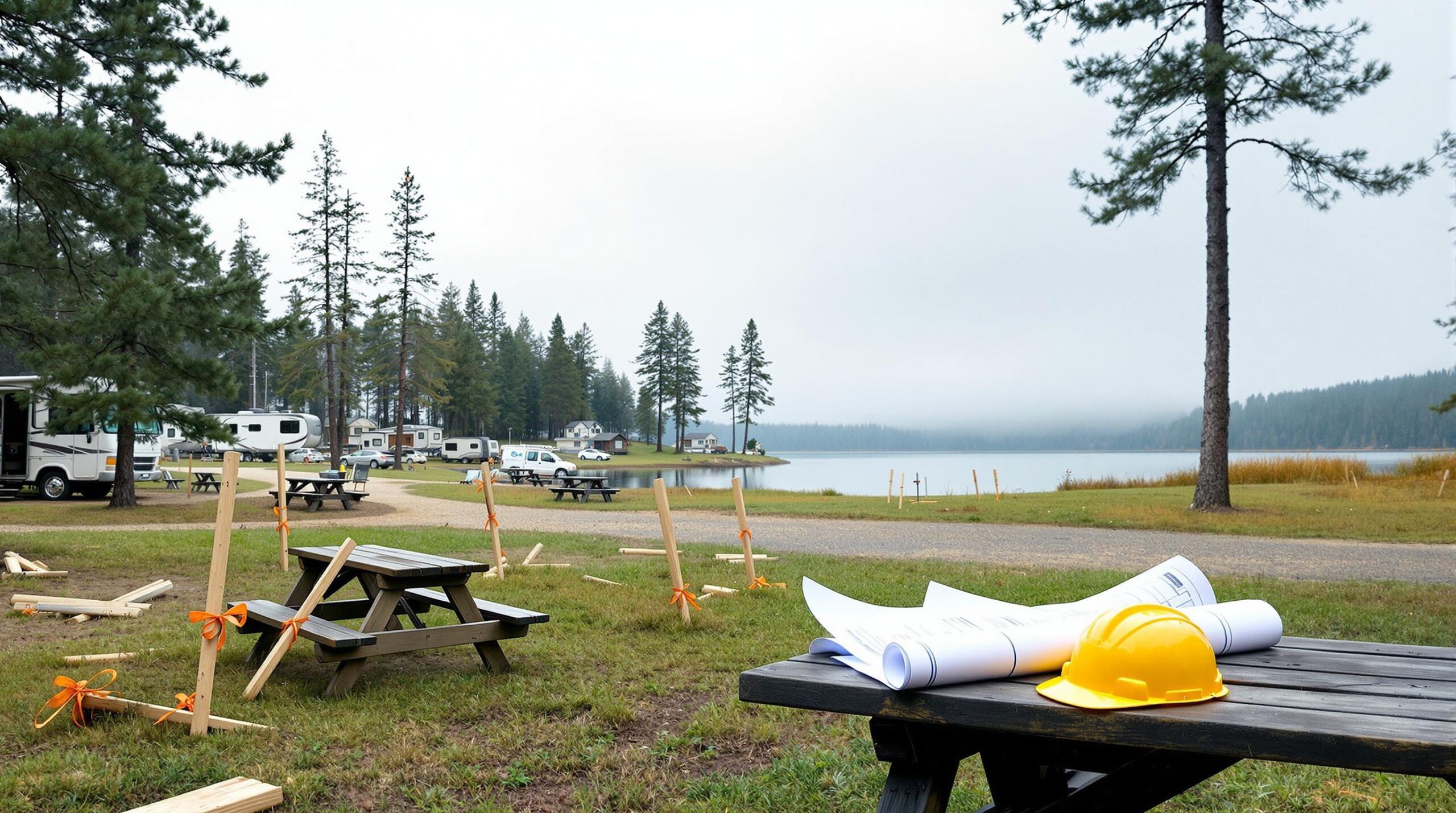WAYNE, Maine — A bid to add 94 park-model campsites to Yogi Bear’s Jellystone Park Camp-Resort: Androscoggin Lake has prompted Wayne officials to prolong a freeze on new campground and RV construction until July 2025, giving the town time to beef up water-quality and land-use rules, according to the selectboard decision.
The board’s Dec. 3 vote extends a moratorium first approved by voters in April 2024 amid fears that the larger resort could imperil Androscoggin Lake and erode the rural feel of the about 1,200-resident town.
For campground owners nationwide, the standoff underscores how surging demand for amenity-loaded resorts must be balanced against the sensitivities of shoreline communities and regulators.
Northgate Resorts, based in Grand Rapids, Michigan, purchased the 150-acre Beaver Brook Campground in early 2021 and rebranded it as a Jellystone Park that summer. The property already featured a heated-pool water park with two tubular slides, an 18-hole miniature-golf course, a disc-golf course, and boat rentals, along with roughly a half-mile of frontage on Androscoggin Lake, transaction records show.
“We’re extremely excited about welcoming Beaver Brook Campground into our Northgate Resorts family as a Jellystone Park location,” CEO Zachary Bossenbroek said when announcing the deal. The company owns and operates 15 Jellystone Park locations nationwide and promised “memorable” guest experiences.
The Wayne expansion would stack 94 semi-permanent park models—each with a kitchen, bathroom and sleeping space for up to eight—inside town lines, boosting peak capacity by roughly 1,000 guests between May and October. “The development proposal was the type of commercial development that was also not compatible with the Wayne Comprehensive Plan goal to protect water quality of Wayne’s ponds and streams, and to ‘protect sensitive natural resources,’” committee member Ted Tucci told the board.
Tucci added, “That’s a quote that comes right out of the Wayne Comprehensive Plan. Those problems still clearly exist. We’ve had algae blooms at Androscoggin Lake for three of the last four years.”
Resident pressure led to the original six-month moratorium, and the volunteer Campground & RV Ordinance Committee is now aligning campground rules with subdivision and zoning bylaws ahead of a Planning Board review on Jan. 16, 2025. “There were things such as language clarification, that also involves meshing of the campground ordinance with the subdivision regulations and the land use or zoning ordinances in town,” committee chair Betsy Clark said.
Clark added, “Also, updating of definitions is needed. Environmental concerns needed more addressing. Density and intensity of use and development, and with respect to the character of our town, we needed to look at maintaining that, but also looking at a balance for development. Those problems still exist.”
Operators weighing shoreline projects can head off similar disputes by weaving proven design features into their site plans. Establishing at least a 100-foot vegetative buffer between any new pad and the water, using permeable road surfaces and rain-garden swales so stormwater infiltrates on site, installing or upgrading to tertiary wastewater treatment sized for peak loads, clustering new sites on previously disturbed land and replacing lost canopy elsewhere, specifying dark-sky compliant lighting and low-noise equipment, and training seasonal staff to brief guests on lake-friendly practices are among the most widely used strategies. These steps can help minimize environmental impact and reduce community pushback, directly benefiting operators planning expansion near sensitive waterways.
While the expansion is on ice, Northgate continues to polish the existing resort. The 2023 season brought the year-round Three Bears Den, which sleeps 16, and additional six-person Cozy Cabins, plus a beefed-up calendar of water-zone attractions and themed weekends, according to the park’s guest-facing blog.
Operators facing construction delays have other levers to keep cash flowing and guests engaged. Introducing high-margin, low-footprint options such as rentable safari tents or pop-up food kiosks that require no new pads, packing shoulder seasons with specialty weekends to boost occupancy, tweaking nightly rates through dynamic pricing software, launching a guest app for contactless upsells, building a community advisory panel to keep neighbors in the loop, and upgrading ADA paths and energy-efficient HVAC while heavier work waits are all practical ways to maintain revenue and guest satisfaction during regulatory holds. These tactics provide a playbook for operators to navigate periods when construction or expansion is delayed.
Wayne voters will decide in June 2025 whether to adopt the revamped ordinance; absent another extension, the moratorium expires the following month.
The episode offers a cautionary tale: without early environmental safeguards and steady community outreach, even well-capitalized campgrounds can see growth plans stalled for years.


